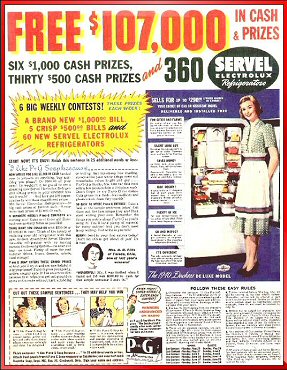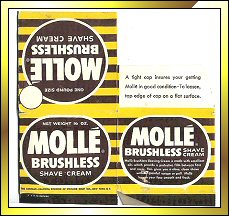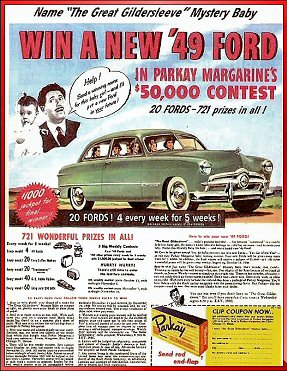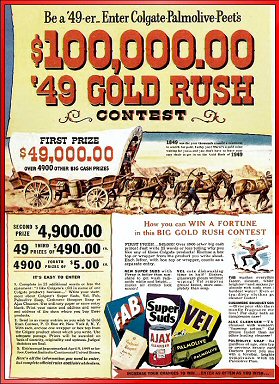Sponsor Promotions
Popular With
Radio Listeners
Part I
“First, you buy 2 10¢ packages of Super Suds or
1 20¢ Giant Size package.
Then you write a letter 100 words or less on this subject:
“Why
I like Super Suds….. Why I like Super Suds.”
-- Jean Paul King
Lincoln,
Me. (DG)—
As I stated in another article, most listeners during
radio’s golden age weren’t very fond of radio advertising.
However, there were exceptions to this way of thinking.
There were radio commercials where the listeners paid close attention
with great interest and anticipation. It
wasn’t a catchy jingle or clever slogan that intrigued the listeners--- it was
the announcer mentioning money and other valuable prizes from a contest.
From time to time, products from Procter &
Gamble, Colgate-Palmolive-Peet, Lever Brothers, and other large and
small companies conducted contests on the radio with valuable prizes to be won.
The 2 most common contests consisted of completing a
sentence on why he/she liked the product in a specific number of words (usually
25 words or less), and the finishing the last line of a limerick about the
product. The 2 contest formats were
easy, but it did require some thought and originality to come up with a quality
entry. Even with some outstanding
entries, the listeners’ chances of winning a prize were very slim--- but it
didn’t stop them from sending in entries with the hope of winning a prize.
I
don’t know exactly what was the first contest heard on radio, but the earliest
contest I have come across took place in 1935 on the CLARA, LU, ‘n EM
program over NBC’s Red Network.
Announcer Jean Paul King described how the listeners could win either a
1935 Packard Sedan or $1000 (extremely valuable prizes by 1935
standards). All they had to do was
to write a letter “Why I like Super Suds” in 100 words or
less. In order to enter this
contest, the listeners had to send in their entries with either 2 10¢ Super
Suds box tops or 1 20¢ Giant Size Super Suds box top.
Wait, there is more! In
addition to the box top(s), King asked the listeners to include the name of the
store where the listeners purchased Super Suds, and the clerk’s
name who sold the soap. By including this information, the clerk was also eligible in
the contest. Instead of announcing
the winners on CLARA, LU, ‘n EM, King said the
contest’s winners were announced on NBC(Blue’s) HOUSE OF GLASS
in the evening (which I assume was also airing the same contest at the time).
Although the sponsors shelled out cash and merchandise
worth thousands of dollars, the contest was a valuable tool for them.
It served 3 different purposes:
1.)
It tested the popularity of the product.
2.) It
tested the popularity of the radio program that product sponsored.
3.)
The contest was an incentive for people to buy and use the product.
 It was important for the sponsor to know the product’s
popularity and the radio program’s popularity that product sponsored.
A good example on how the sponsor monitored both product and program was
a 1940 PandG Naphtha Soap Contest. It was important for the sponsor to know the product’s
popularity and the radio program’s popularity that product sponsored.
A good example on how the sponsor monitored both product and program was
a 1940 PandG Naphtha Soap Contest.
 The enclosed magazine ad and radio commercial were from the same contest.
To test the popularity of PandG in the magazine ad, the
listeners sent their entries and 4 PandG Naphtha Soap wrappers to
this address:
The enclosed magazine ad and radio commercial were from the same contest.
To test the popularity of PandG in the magazine ad, the
listeners sent their entries and 4 PandG Naphtha Soap wrappers to
this address:
PandG Naphtha Soap
Dept. MC, Box 25
Cincinnati, Ohio
At that time, the same PandG
contest was presented on THE GUIDING LIGHT.
To test the popularity of both the product and the radio
program, announcer Fort Pearson informed the listeners to send their entries and
soap wrappers to:
The Guiding Light
Cincinnati, Ohio
This
contest spanned 6 weeks. To keep
the listeners interested, there were winners each week for the contest’s
duration. On THE GUIDING
LIGHT’s Friday broadcasts, Pearson announced the winner of the
$1000 1st Prize and the 5 $500 2nd Prize winners (in order
to preserve time, the 60 Servel Electrolux Refrigerators 3rd
Prize winners weren’t mentioned on the air).
Although
serial programs featured contests the most, there were some interesting and
unusual contests heard on the evening radio programs.
 In
1946, Mollé Brushless Shave Cream had a very unique contest.
Instead of completing a sentence or finishing a limerick about the
product, this contest didn’t require anything about Mollé.
Heard on the MOLLÉ MYSTERY THEATER, announcer Dan
Seymour informed the listeners to write a short story about “My Closest
Shave.” It was to be a
story of an actual experience where the listeners had a close call with danger,
embarrassment, failure, or anything unpleasant.
Since Mollé sponsored this contest, the end flaps from a Mollé
carton were included with each story. The
prizes awarded for this contest totaled $25,000.
For the winning entries, the Grand Prize winner received a $3500 vacation
or cash; 5 2nd Prize winners received a 1946 Ford
automobile; 10 3rd Prize winners received an Emerson Tabletop
Television & Radio/Phonographs, and 75 other winners
received a small cash prize. Since
any man, woman, and child could experience a close call in their lives, the Mollé
“My Closest Shave” Contest was open to everyone whether they shaved
or not— as long as the Mollé
carton end flaps were included. In
1946, Mollé Brushless Shave Cream had a very unique contest.
Instead of completing a sentence or finishing a limerick about the
product, this contest didn’t require anything about Mollé.
Heard on the MOLLÉ MYSTERY THEATER, announcer Dan
Seymour informed the listeners to write a short story about “My Closest
Shave.” It was to be a
story of an actual experience where the listeners had a close call with danger,
embarrassment, failure, or anything unpleasant.
Since Mollé sponsored this contest, the end flaps from a Mollé
carton were included with each story. The
prizes awarded for this contest totaled $25,000.
For the winning entries, the Grand Prize winner received a $3500 vacation
or cash; 5 2nd Prize winners received a 1946 Ford
automobile; 10 3rd Prize winners received an Emerson Tabletop
Television & Radio/Phonographs, and 75 other winners
received a small cash prize. Since
any man, woman, and child could experience a close call in their lives, the Mollé
“My Closest Shave” Contest was open to everyone whether they shaved
or not— as long as the Mollé
carton end flaps were included.
There
were also contests where the stars and characters from a radio program
participated. In this example, the outcome from a 1948 Parkay Margarine
contest had an impact on the program’s story.
 The
contest was set up on THE GREAT GILDERSLEEVE’s first broadcast
of the 1948-1949 season. It began
with Throckmorton P. Gildersleeve finding an abandoned baby girl in his car.
No one knew the identity of the baby or who left her in Gildersleeve’s
car. This began a series of
episodes concerning “The Mystery Baby”--- and a contest.
Parkay conducted a contest for the listeners to help
Gildersleeve name “The Mystery Baby.”
Since the listeners couldn’t see what The Mystery Baby looked like on
the program, announcer John Wald described what she looked like on the Parkay
commercials. In the Parkay magazine ads, there was a picture
of Gildersleeve holding the baby. The
contest spanned 5 weeks with weekly winners on each GREAT GILDERSLEEVE
broadcast during the 5 week period. The
prizes given away each week consisted of a 1949 Ford Automobile
for the 1st Prize winner; a Cory Coffee Maker
for 4 2nd Prize winners; a Toastmaster Toaster for 4 3rd
Prize winners; a General Electric Table Radio for 8
4th Prize winners; and $10 for 12 5th Prize Winners.
Unlike the PandG Naphtha Soap Contest mentioned earlier,
this contest also had a $1000 Grand Prize given to the best overall entry of the
contest. That entry would be the
baby’s name on the program. The
contest was set up on THE GREAT GILDERSLEEVE’s first broadcast
of the 1948-1949 season. It began
with Throckmorton P. Gildersleeve finding an abandoned baby girl in his car.
No one knew the identity of the baby or who left her in Gildersleeve’s
car. This began a series of
episodes concerning “The Mystery Baby”--- and a contest.
Parkay conducted a contest for the listeners to help
Gildersleeve name “The Mystery Baby.”
Since the listeners couldn’t see what The Mystery Baby looked like on
the program, announcer John Wald described what she looked like on the Parkay
commercials. In the Parkay magazine ads, there was a picture
of Gildersleeve holding the baby. The
contest spanned 5 weeks with weekly winners on each GREAT GILDERSLEEVE
broadcast during the 5 week period. The
prizes given away each week consisted of a 1949 Ford Automobile
for the 1st Prize winner; a Cory Coffee Maker
for 4 2nd Prize winners; a Toastmaster Toaster for 4 3rd
Prize winners; a General Electric Table Radio for 8
4th Prize winners; and $10 for 12 5th Prize Winners.
Unlike the PandG Naphtha Soap Contest mentioned earlier,
this contest also had a $1000 Grand Prize given to the best overall entry of the
contest. That entry would be the
baby’s name on the program.
The
naming of “The Mystery Baby” wasn’t the first contest of this kind.
A similar contest took place on Bob Hope’s PEPSODENT PROGRAM
in 1940. The baby in question
wasn’t mysterious, and it was a real live baby.
The listeners had to come up with a name for the baby daughter of
announcer Bill Goodwin (no relation). In
doing this, the Pepsodent Company offered cash prizes to 1367
winners, including $5000 for the best entry and $1000 for 2nd Prize.
The listeners submitted the name along with a carton from any 1 of 3 Pepsodent
dentifrice products--- Pepsodent Tooth Paste, Pepsodent Tooth
Powder, or Pepsodent Liquid Dentifrice.
At this time, it isn’t known what the winning name was, and if Goodwin
and his wife used that name for their daughter.
In
1944, the makers of Swan Soap wanted to make sure every radio
listener knew about the “Name Mama Swan” contest.
 Instead of 1 program, the contest was presented on 2 programs.
During the daytime, announcers Paul Luther and Grace Russell described
the details of the contest on the BRIGHT HORIZON serial program on
CBS. In the evening, the
contest was also presented on the GEORGE BURNS & GRACIE ALLEN
SHOW, also on CBS. In
addition to coming up with a name for Mama Swan, the listeners had to complete
the sentence “I like Swan Soap better because…..” in 25
words or less. If that sounds like
a lot of work for the listeners, the Grand Prize of $100 a month for life (or
$20,000 in a lump sum) made that extra work well worth it.
Instead of 1 program, the contest was presented on 2 programs.
During the daytime, announcers Paul Luther and Grace Russell described
the details of the contest on the BRIGHT HORIZON serial program on
CBS. In the evening, the
contest was also presented on the GEORGE BURNS & GRACIE ALLEN
SHOW, also on CBS. In
addition to coming up with a name for Mama Swan, the listeners had to complete
the sentence “I like Swan Soap better because…..” in 25
words or less. If that sounds like
a lot of work for the listeners, the Grand Prize of $100 a month for life (or
$20,000 in a lump sum) made that extra work well worth it.
 Contests
on the radio weren’t necessarily reserved for just 1 product.
In 1949, the Colgate-Palmolive-Peet Company sponsored the “$100,000
’49 Gold Rush Contest” for 6 of the company’s cleaning and soap
products. The products
participating in this contest were Fab, Super Suds, Vel Powder, Palmolive
Soap, Ajax Cleanser, and Cashmere Bouquet Soap.
The commercials for this contest were heard on all radio programs that
sponsored any of the 6 products. It
was also a contest that the number “49” had a definite meaning.
In 25 words of less, the listeners completed the sentence, “I like Colgate’s
(name of product) because…..” Instead
of a specific product, the listener selected 1 of the 6 Colgate-Palmolive-Peet
products mentioned. The winning
entry of this contest won a nice sum of $49,000.
The other prizes consisted of $4900 for the 2nd Prize winner;
$490 for 49 3rd Prize winners; and $5 for 4900 4th Prize
winners. Contests
on the radio weren’t necessarily reserved for just 1 product.
In 1949, the Colgate-Palmolive-Peet Company sponsored the “$100,000
’49 Gold Rush Contest” for 6 of the company’s cleaning and soap
products. The products
participating in this contest were Fab, Super Suds, Vel Powder, Palmolive
Soap, Ajax Cleanser, and Cashmere Bouquet Soap.
The commercials for this contest were heard on all radio programs that
sponsored any of the 6 products. It
was also a contest that the number “49” had a definite meaning.
In 25 words of less, the listeners completed the sentence, “I like Colgate’s
(name of product) because…..” Instead
of a specific product, the listener selected 1 of the 6 Colgate-Palmolive-Peet
products mentioned. The winning
entry of this contest won a nice sum of $49,000.
The other prizes consisted of $4900 for the 2nd Prize winner;
$490 for 49 3rd Prize winners; and $5 for 4900 4th Prize
winners.
Contests
were fun to participate, but it was also something the listeners took very
seriously. Radio Guide
magazine had a special feature of the latest contests heard on the radio and
instructions on how to enter those contests.
From time to time, the magazine also featured articles on tips for
creating winning contest entries.
With
the huge piles of box tops, wrappers, cartons, and other product stuff, the
sponsor discovered their contests were extremely popular.
The opportunity for the listeners to win large sums of money and
merchandise was too good to pass up. In
Part II of this series, we will explore another popular advertising promotion,
the premium offer.
|